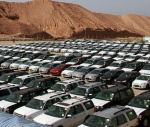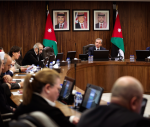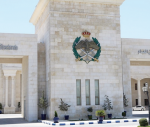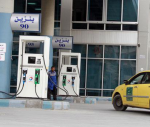You are here
Kobani — key battle for US, its coalition
Oct 22,2014 - Last updated at Oct 22,2014
Since the summer of 2011, the military policy on Syria of the US and the West has been based on the imaginary rebel Free Syrian Army (FSA), and since December of that year, US and Western political strategies have relied on the divided and dysfunctional exiled opposition.
This was initially represented by the Syrian National Council (SNC), which became the National Coalition (also SNC) 11 months later, when the council proved to be unmanageable and ineffective.
Both the FSA and the SNC were creations of Ankara, its only objective being the ouster of Syrian President Bashar Assad.
Last week, Washington finally, belatedly, dropped the FSA. The US did not invite FSA to the high-level conference of military officials at Andrews Air Force Base near Washington, chaired by armed forces chief Martin Dempsey.
The focus of discussions was countering the Islamic State, the armed cult that the US, again belatedly, realised poses a threat to the region and the international community as a whole.
According to retired US General John Allen, coordinator of the struggle against IS, the US has decided to ditch FSA in this campaign and to recruit and train 5,000 local “moderates” for the coming ground offensive.
“At this point, there is not (sic) formal coordination with the FSA,” Allen told journalists at the State Department.
The US had formerly relied on the FSA to provide the muscle to oust Assad, a task the diverse and divided 1,500-2,000 factional militias fighting in Syria, some under the FSA banner, could never accomplish.
These small factions competed and, occasionally, fought for pelf and power, while complaining nonstop that they were not properly armed to take on the Syrian regular army and associated militias.
In fact, since the FSA had no formal structure beyond a succession of military councils composed of defected Syrian army officers, depriving it of command and control, this formation never existed. This is one very good reason the supply of even small arms was uncertain.
The FSA was a fiction of the imagination of US, Western policy makers and some journalists, and was exposed as such when IS, Jabhat Al Nusra and a host of radical fundamentalists became the leading armed formations operating in Syria.
The other fundamental fiction of the Syrian struggle has been that the SNC was a representative of the Syrian people.
This was never the case.
Syrians within Syria never accepted this body, largely comprised of Syrian exiles who had not lived in the country for decades and dominated by the outlawed Syrian Muslim Brotherhood.
The SNC was elevated to the status of negotiator for the opposition during the failed Geneva peace negotiations, held early this year, but failed to rise to the challenge of facing the government, which was gradually rolling back insurgent forces around Damascus and in other strategic areas while fundamentalists, including IS, asserted control of the north.
No one speaks of the SNC these days. Its deliberations are ignored.
Recently, the SNC reinforced the division in the ranks of the exiled opposition by electing Saudi-sponsored Hadi Al Bahra as its president and choosing Qatari-backed Ahmad Tohme as prime minister of the Turkey-based government-in-exile, although his Cabinet was dismissed for non-performance.
It is a tragedy that the US and its allies have taken so long to stop betting on the “wrong horses” in the race to win Syria. Too many Syrians have died, too many have been driven from their homes: six million displaced and four million exiles.
The US and its partners are now betting on determined units of Kurdish militiamen and women belonging to the protection units of the Democratic Union Party (PYD) to hold the line against IS in the small, dusty town of Kobani (with a normal population of 60,000) near Syria’s border with Turkey.
After weeks of refusing to open its border to Syrian (and Turkish) Kurds seeking to reinforce the defenders of Kobani, Ankara on Monday agreed to permit Iraqi Kurdish peshmerga to cross its territory to relieve the besieged and beleaguered Syrian Kurdish fighters.
Turkey agreed only after the US air force dropped small arms, ammunition and medical supplies — said to be from Iraqi Kurds — to the fighters.
Ankara capitulated to the US fait accompli and agreed to allow peshmerga to transit Turkish territory because Iraq’s Kurds were involved and Turkey enjoys friendly relations with Erbil.
Iraq’s Kurdish region is Turkey’s only local neighbour with which Ankara enjoys good relations.
Ankara regards the PYD as an offshoot of the separatist Turkish Kurdish Workers Party (PKK) which, for 30 years, has been battling the Turkish government for autonomy/independence. Turkey branded the PKK a “terrorist” movement and imprisoned its chief, Abdullah Ocalan, but has been negotiating a peace deal with the PKK for the past two years, a peace deal that has been on the brink of collapse due to Prime Minister Recep Tayyip Erdogan’s refusal to consider relieving the Kurds in Kobani.
Kobani has been a key battle for the US and its reluctant coalition because the fall of the Kurdish enclave, which declared autonomy some months ago, would be a major propaganda and moral victory for IS.
This is of utmost importance to IS, a cult which relies on its “spiritual” power to attract recruits, financial support and arms supplies, as well as the allegiance of far-flung fundamentalist factions like Al Qaeda in the Arabian Peninsula and the Filipino Abu Sayyaf.
The moment IS begins to retreat from siege operations or yield territory, the cult will lose what could be called its “mandate of heaven”, its “baraka” and the right to command the backing of alienated Muslims the world over.
Muslims angry over Western interference and intervention in their countries’ affairs. Muslims furious over Israel’s occupation of Palestine and Israel’s latest brutal assault on Gaza. Muslims who simply want to lash out, to punish the West. Muslims who reject the 21st century neo-liberal approach to religious, cultural and social affairs as the 20th century failed to provide dignity, democracy and prosperity.













